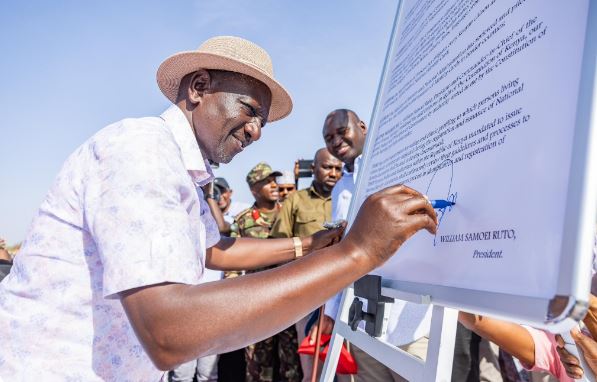
 President William Ruto signing the Presidential Proclamation on Registration and Issuance of IDs to Border Counties at Orahey Grounds in Wajir Town on February 5, 2025./PCS
President William Ruto signing the Presidential Proclamation on Registration and Issuance of IDs to Border Counties at Orahey Grounds in Wajir Town on February 5, 2025./PCS
President William Ruto’s administration has intensified efforts to consolidate the Northeastern region, comprising Marsabit, Mandera, Isiolo, Garissa and parts of Upper Eastern.
This is through a multi-pronged strategy focusing on
security, infrastructure and political inclusion, with Kenya Kwanza showing
signs of a bid to address historical marginalisation.
As the 2027 elections loom, the government appears keen on
addressing development concerns while countering security threats and boosting
economic prospects.
Keen on cementing its political foothold ahead of the 2027
elections, Kenya Kwanza is pulling out all the stops to integrate the
long-neglected region into the nation’s political mainstream.
Pundits observe that the push into Northeastern spearheaded
by Deputy President Kithure Kindiki is a calculated bid to secure a region long
neglected, yet has untapped potential.
Kenya Kwanza administration is making an aggressive play to
win hearts and minds through infrastructure projects, security overhauls and
socio-economic interventions.
At the heart of the scramble for Northern Kenya is the
Isiolo-Mandera road, a 760-kilometre connection slicing through Isiolo, Wajir and
Mandera counties.
It is no ordinary road, and is deemed the largest ongoing
infrastructure project in the country and is viewed as a game-changer once
completed.
The government, keen to fast-track its completion, has
divided the project into sections, assigning different contractors to ensure
speed and efficiency.
Once complete, the road will not only connect Kenya to
Ethiopia and Somalia but also unlock trade, improve security and slash travel
times that have for decades stifled economic growth.
“The greater Northern Kenya region is receiving full government
attention to ensure affirmative action measures to correct historical mistakes
that have caused some parts of our country to receive development funding that
is disproportionately low compared to the needs,” Kindiki said during his
recent tour of the region.
During a fundraiser for women-led SMEs in Marsabit, he said,
“The government was also putting up markets, housing and electricity projects
in the region and mobilising local communities for registration into the Taifa
Care universal medical insurance drive.”
But perhaps the most consequential shift has been the
abolition of discriminatory vetting requirements for national identity cards.
For years, thousands of Kenyan Somalis were locked out of
citizenship documents, denied the right to vote, open bank accounts or even
register mobile SIM cards.
Today, with streamlined registration processes, they are
finally being recognised as full citizens, a move that has not only restored
dignity but also reshaped the political landscape.
"This is not just about roads or IDs," Kindiki declared during a recent rally.
"It is about rewriting the story of Northern Kenya,
from a forgotten frontier to a thriving economic hub."
A section of leaders from the region have resolved to work with
President Ruto beyond 2027, citing the interventions as inspiring hope.
“Our people are behind President Ruto. We will support him 100 per cent in the election. He shouldn’t panic because we have seen the hand of the government,” Marsabit Governor Ali Mohamud said.
ASALS and Regional Development PS Kello Harsama said the region has for the first time, felt the government, unlike the past, when all that was given were verbal assurances.
“For the first time since independence, we have a government
we can call ours. We have, since 1963, been forced to tell people we are in
government when in reality we were not,” the PS said.
“We have no way of saying thank you but to wake up early in
August 2027 and hand Ruto a second term. We have people getting IDs for the
first time.”
The administration has also poured billions into the Last Mile
Connectivity Programme, bringing electricity to households that have relied on lanterns
and diesel generators.
Eldas MP Adan Keynan, the longest-serving MP, said support
for Ruto is driven by trust and gratitude for his administration's
focus on marginalised areas like Northern Kenya.
“Ruto's administration has invested in
infrastructure, education, security and economic empowerment across Northern
Kenya," he said, adding, "This has reignited hope in a region
long neglected and, for that, we stand firmly behind him."
For the government, “the impact is already being felt in
grassroots enterprises, where small traders and artisans now operate beyond
sunset”.
The government has also rolled out a livestock restocking
programme under the National Disaster Management Authority and the State Department
for Livestock Development.
This is to respond to the devastating effect of drought on pastoralist
communities and mitigate on dwindling stocks.
Education, too, has been revitalised with classrooms
and laboratories sprouting in schools across the region as part of the effort
to bridge the gap between marginalised areas and the rest of the country.
In February, President Ruto conducted a four-day development tour across Mandera, Wajir, Garissa and Isiolo counties and made commitments that the leaders are currently following through.
INSTANT ANALYSIS
As the 2027 elections draw nearer, the political calculus is undeniable. Northeastern, with its growing electorate and newfound government attention, is no longer an afterthought.
It is a battleground, and Kenya Kwanza’s
courtship of its people, through concrete development and inclusive policies, may
well determine who holds power in the next decade. The road to Mandera is being
paved, the lights are coming on and the IDs are finally in hand.













